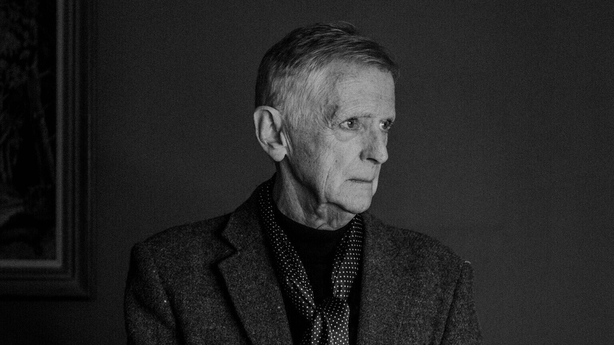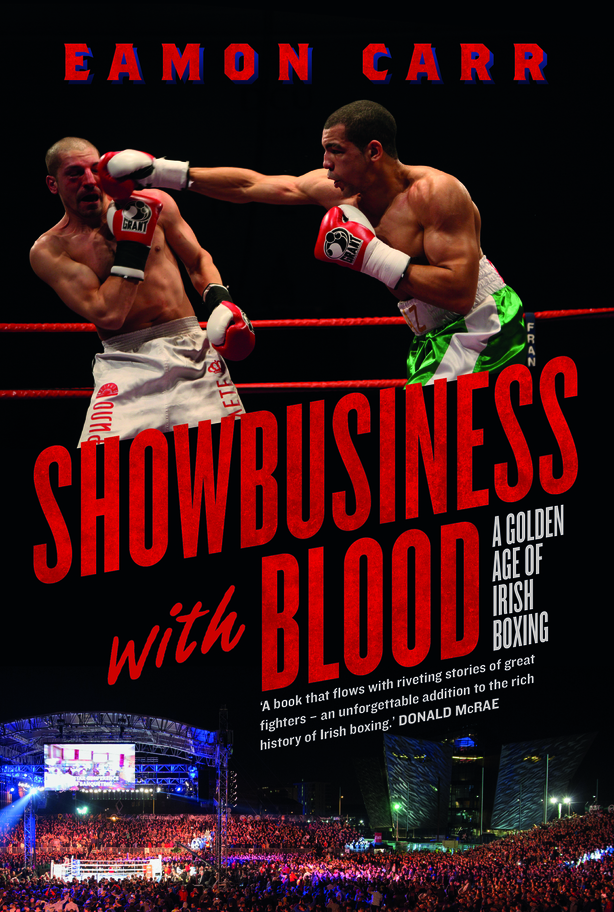We present an extract from Showbusiness with Blood: A Golden Age of Irish Boxing by journalist, author and former Horslips musician Eamon Carr.
In Showbusiness with Blood, Eamon Carr beguiles the reader with an insightful account of the world's greatest boxers, from Steve Collins to Mike Tyson to Tyson Fury and Katie Taylor.
Boxing, Ireland’s most successful Olympic sport, became turbo-charged in the mid-90s. A golden age followed as Irish boxers excelled in the harsh, violent and sometimes tragic business that is professional boxing. Having become enamoured of the sport during a period of serious illness as a child, Eamon Carr was on hand to witness the victories and disasters.
I was introduced to boxing years before television became commonplace in Ireland. As a small boy, I accompanied my father to the local amateur boxing gym, where he was on the coaching team. He also took me along to various tournaments.
Around this time I also spent months in a sanatorium with chronic bronchiectasis, the dilation and destruction of the airways. Visiting uncles would regale me with accounts of the latest big fight they'd heard on the radio or seen on newsreels in the cinema. It wasn’t until years later that I discovered my illness had, for a time, been life-threatening.
Looking back, it’s obvious that, in attempting to raise my spirits, my uncles resorted to the kind of psychology trainers like Eddie Futch used to motivate fighters. Gathered around my bed, ducking, weaving and throwing punches, they’d engage me with vivid, epic stories of real flesh-and-blood superheroes who fought against the odds. And won. Their kidology worked. I eagerly awaited the following week’s instalment.
I knew I was ill. There were innumerable painful injections daily and various scary tests. The days lying in bed on a veranda in the open air, watching the clouds and listening to birds in nearby trees, were the best. When some patients disappeared suddenly, we assumed they’d been allowed go home. Nurses smiled wanly and seemed sad. I was too young to know that this was primarily a TB hospital. I hadn’t heard of tuberculosis and didn’t realize I was surrounded by children at death’s door.
Neighbours sent relics of the saints: Don Bosco, Blessed Martin, Dominic Savio. I sensed these guys were on my side but, always triumphant, St Marciano was the one I thought about most. Because of him, I had something to aim for. I desperately wanted to get home to my friends and revisit the gym – the crackling excitement of the young boxers in training, skipping ropes beating mesmeric rhythms on the wooden floor, the staccato snap of the speed bags, the thud of gloved fists sinking into the heavy bags and the acrid air heavy with the pungent aroma of wintergreen and liniment. Though bedridden, I was already there, training with the big boys.
In my innocence I convinced myself that I might even become a champion one day. If not of the world, then maybe of my school. Or even my street. But most of all I just wanted to be allowed out of my iron bed. Much deeper down was a profound wish that somehow or other I’d get to star in the ring at the National Boxing Stadium in Dublin. Childish dreams. As Lucinda Williams sings, 'If wishes were horses, I’d have a ranch.’
And so, on those dark terrifying nights, as I lay sweating, struggling for breath, retching and spewing mucus into an enamelled basin and hearing my fragile chest wheezing like a battered old accordion, I wasn’t alone. I was part of the great boxing universe. A tiny pinprick of light circling the heavens, orbiting an endless celestial ring in the company of glowing and fiery stellar giants. In my imagination, I was a southpaw, jabbing, hooking, keeping my guard up, boxing shadows. Yes. I was going to come out fighting. That’s what we boxers, big and small, did. One more round. One more chance. Please.
Danny X was my hero. He lived nearby and boxed in national tournaments. He even got to represent his country. This was a really big deal to us youngsters in the bleak 1950s. Because our families were friends, it felt as if I had skin in the game. Being described in the press as ‘a KO specialist’, Danny had unofficially become our representative, as notable as any local politician or inter-county GAA player.
I was still just a nipper the time, with my father, when I saw Danny fight. The heavyweights had come in towards the end of the night. Enormous men. The bigger of the two was a huge, fleshy individual with thick legs, muscular arms and a head that looked like it was carved from granite. I couldn't imagine how the shorter boxer, who looked a lot lighter, might survive. When the bell tolled, the two men advanced, snorting loudly as they threw punches that smacked the other’s gloves. Close to ringside, the thud of their boots on the canvas floor was deafening. The referee, who attempted to pull them apart when they clinched, looked puny in contrast to these lumbering leviathans.
As they huffed and puffed, the primitivism of the big men held me enthralled. Appearing to snuggle tight to his opponent during the third round, the smaller man swung a sharp-right hook that connected with the giant’s jaw. I'd seen bombed buildings collapse on the cinema screen and that was all I had to compare it to. A tall building of bone and blubber, the big man wobbled and then keeled over with such a resounding crash I thought the floor of the ring would shatter.
I gasped and looked to my father for a response to the intensity of the spectacle, the premonition of disaster and evocation of ruin that had just played out in front of us. 'A glass chin,’ he said.
At a time of national economic paralysis, forced emigration and cultural stagnation, Danny was one of a few people whose example showed how, if we fought with courage and determination, we could ultimately emerge victorious.
While Danny was collecting accolades, I was setting an unenviable record among my classmates. No one else had spent as much time in so many different hospitals. My mother being ill, my father was no longer assisting the local sports-mad curate who’d set up a boxing club as a community initiative. When I was 8 years old, disaster struck. My mother died young. Grief-stricken and confused, I became somewhat wayward. The spectre of the orphanage loomed as my father fought to keep his young family together.
The gang of older delinquents I hung out with lived for the weekends when they’d travel to different towns for street fights. It sounded exciting but I was still in short trousers. Before I got to tag along, my relatives staged an intervention. That’s when I was shipped off to boarding school, a uniquely alien environment for an atrisk juvenile with personal issues. In St Finian’s College, the diocesan school for Meath, contact with the outside world was forbidden. Newspapers, radio and TV were banned. While on school holidays, I was shaken by a newspaper headline. ‘Trail of Blood on City Street’. The story concerned a bloke who’d been sentenced to penal servitude for life for having beaten someone to death. It was Danny.
Homicides weren’t frequent back then so the case dominated the headlines. Respected by his peers in boxing, and from a respectable family, Danny had somehow slipped through the cracks. Months of sleeping rough and drinking cheap wine in alleyways and at camp fires on waste ground had led to petty crime, violence and, ultimately, incarceration. Something had gone tragically wrong.

Later, in the 1980s, I’d begun writing about my interests for newspapers and magazines. As fate would have it, a new career as a journalist coincided with a steady boxing renaissance in Ireland. Michael Carruth won a gold medal at the Barcelona Olympics in 1992. Steve Collins became WBO world super-middleweight champion in 1995. As many more Irish fighters began winning world titles, the skinny, pale youngster from the sanatorium was with them, every step of the way.
Through a curious alchemy of fate and fortune, the wish he’d nurtured as he’d received extreme unction – an anointing with oils of the sick and dying – saw him afforded opportunities denied his father. He became a regular at ringside on the big nights. Got to be in the gym, at the weigh-in and even in the changing room. He observed the fighters’ extreme training regimes, glimpsed their private torment and probed their self-belief. He shared their joy and celebration and felt their loss, their dejection, their despair. This being boxing, the dramatic painful interface between glory and failure, fulfilment and frustration, he watched, time and again, the lives of brave men, and women too, turn, to reference Virginia Woolf, on ‘moments of humiliation and triumph’. The frail, ‘delicate’ kid lived to witness, first-hand, a golden age for Irish athletes in the toughest, most ruthless, most demanding sport of all.
I sometimes wonder if I should have spoken more to my father about the boxers I met and the fights I’d been at. I didn’t, of course, for fear of opening a door on a shadow world of painful memories. Besides, I was reluctant to revisit my early years of motherless anxiety, that bleak time when there was no hope. None of my friends or acquaintances cared much for boxing. The fights were something I went to alone.
In hindsight, the currency that appealed to me most in boxing was hope. Hope is ingrained in boxers. ‘I didn't win but I’ll beat him in the return.’ Curiously, at ringside I found a new family, a sodality of the knowing, a confraternity of the classless. People for whom hope wasn’t an abstract theory. As Muhammad Ali said, ‘If you even dream of beating me you’d better wake up and apologize.’

Showbusiness with Blood: A Golden Age of Irish Boxing is published by Lilliput Press

